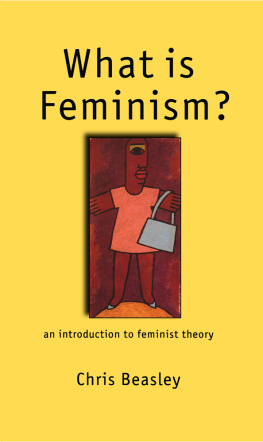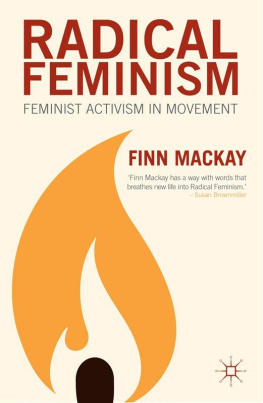Lorenza Perini
University of Padua
Giving Feminism a bad name:
the uprising of the anti-feminism instances in times of populisms
Ledizioni
2021 Ledizioni LediPublishing
Via Antonio Boselli, 10 20136 Milano Italy
www.ledizioni.it
Giving Feminism a bad name: the uprising of the anti-feminism instances in times of populisms
Lorenza Perini
First edition: July 2021
Print ISBN 978-88-5526-507-2
eBook ISBN 978-88-5526-508-9
Table of Contents
Feminism/anti-feminism/post-feminism
1.
Feminism as a popular brand
Anti-feminist groups and the institutional anti-feminism
4.1.
4.2.
4.3.
4.4
Against the Backlash, towards New Solidarities
Foreward In a wild elsewhere
I want to dedicate this small essay of mine to my students at the University of Padua.
Up to now, my commitment as a professor of gender politics in this institution has always been a testing ground, where Ive been able to experiment believes and theories in order to renew and refine my political culture and my posture as a white, female and feminist scholar.
Tackling an issue like gender equality implies considering a situation of unbalance and the attempt to repair the scene with tools like policies and practices, for example.
The feminist perspective, on the contrary, leads to consider a transformation, a completely new scenario, different from the one that has produced the unbalance.
The pro/contra, yes/no, equality/inequality logic, at best, leads to a static condition. The goal in the feminist perspective is, instead, open and fluid, balance is just a step towards something ahead, towards the goal of freedom and self-determination for all.
Something achievable only through a transformative process.
It is not repairing the wounds of the wounded, but moving forward.
Towards a wild elsewhere.
History proves it. It is demonstrated by current events, which increasingly bring to the forefront of the media a huge amount of cases of mortification of the dignity of human beings and in particular of women, who are not free to choose, who are not in the condition to be -as much as men are- free.
Every day their body is a bargaining chip, a reward, a battlefield and a weapon at the same time, and after decades of struggle, under certain perspectives, freedom for all still seems to be a distant goal.
Over time, scenarios may have changed, the legislative system kept pace with social change and some - many - stereotypes on the roles of sexes in society may have fallen under the weight of the continuous pressure of the feminist groups -together with the anti-discrimination forces and other social movements- and parts of this freedom have now been conquered, and not just for women.
Fortunately, the new generations seem at times to be much more sensible to inequality and abuses, and this is definitely a positive result of the patient and tenacious work of those who have always believed now and in the past- in the patient and persistent dissemination of a culture of respect and equality for all.
Much remains to be done, the forms of concealment of freedom are increasingly hidden and camouflaged; new forms of slavery may even present themselves wearing the mask of freedom.
What type of weapon do we have at our disposal at this point?
In this scenario, what I want to address most, is precisely this: it is of crucial importance to pay a constant and continuous attention to the language we use to speak about gender, women, feminism.
Words build the world.
We cant get them wrong.
Do handle them with care.
Introduction
1. The research question
The questions I pose to myself in this essay are apparently simple: why has feminism grown so unpopular in the last decade? Why does the mere mention of the word give rise so frequently to negative, disdainful -sometimes even ugly- responses? From a different perspective: what is behind the current anti-feminist backlash? And finally: what can feminism learn from all this?
Nowadays, anti-feminism includes people specifically women- who do not feel represented by what the feminist movement refers to: they find it dangerous and absolutely unnecessary, because women can have it all. As posed by Christiensen and Hyer (2015), women have good reasons to fear feminism since
to stand opposed to your culture, to be critical of institutions, behaviours, discourses--when it is so clearly not in your immediate interest to do so--asks a lot of a young person, of any person.
Considering how everything is framed in mass communications, today dissenting social campaigns can spread very easily, especially in online forums. According to Sherryl Vint, as regard to feminism we have been facing an online backlash so far, where womens equality is treated as a fact that no sensible person would deny and feminism is made to seem ridiculous and pass in its insistence on still talking about gender discrimination when we all clearly live in a post-feminist utopia.
New backlash compromises feminisms ability to critique economic and other gender divisions that still disadvantage women, and it evacuates political consciousness from the consumption of popular culture by reducing gender questions to personal stories, refusing to acknowledge structural problems (Vint 2010).
The most notable example in this sense is the Women Against Feminism (WAF) campaign, emerged during summer 2013 on the social media Tumblr. The basic WAF assumption is that gender equality has already been achieved and the feminist instances are no more relevant in the todays society. Testimonies of the campaign are invited to share and disseminate pictures of themselves holding papers and billboards with statements describing why the feminist movement disappoints them. Most of the statements underline the acceptance of the biological determinism, like this one, reported by the philosopher Margarethe Mapes:
I am a woman. I adhere to traditional gender roles. I am a Christian and a conservative. I aspire to be a stay-at-home mom one day. I have known a variety of feminists, all of whom responded to my personal choices and beliefs with scorn and hatred. They have done nothing but dehumanize me and my family, friends, and colleagues who hold the above beliefs and make the above choices. I dont need feminism, and I will not allow individuals to quote dictionary definitions at me and call me ignorant. The dictionary still defines marriage as a union between a man and a woman, which isnt always the case in practice. Feminists have changed the definition, and I dont want to be, in any way, associated with modern, third wave feminism. (Mapes, 2016).
WAF blames feminists of having destroyed morality and happiness in women life. Furthermore, they accuse them of hating men, being angry or hysterical, spurring victimhood in relation to rape (drunk sex and catcalling cant be count in), having caused crisis in marriage, consuming traditional family values (such as motherhood) and aiming for superiority and not equality. The new anti-feminists strategy they offer relies on love: the realization of the individual contentment passes through an heterosexual relationship. According to Mapes again:
The old backlash attempted to frighten women into accepting traditional gender roles and identifying with such roles as their only authentic source of personal happiness. The new backlash realizes that it is unlikely that women en masse will be forced back into the home and exclusively domestic roles, yet still tries to distance women from feminism and convince them that their lives should revolve around the heterosexual family. (Mapes, 2016).








